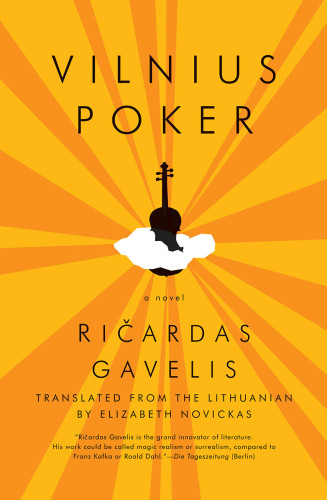
Vilnius Poker
- اطلاعات
- نقد و بررسی
- دیدگاه کاربران
نقد و بررسی

October 20, 2008
An assemblage of troubled grotesques struggle to retain identity and humanity in an alternately menacing and mysterious Vilnius, the Lithuanian capital, under Soviet rule in the 1970s and 1980s. The late Gavelis's first translation into English centers on Vytautas Vargalys, a semijustifiably paranoid labor camp survivor who works at a library no one visits while he desperately investigates the “Them” or “They” responsible for dehumanizing and killing the humans around him, including his wife, Irena; his genius friend, Gedis; and the young siren, Lolita. Meanwhile, failed intellectual Martynas chronicles Vargalys's struggle and the city's mysterious energy in his “mlog,” library worker Stefanija Monkeviciute dwells on her wavering faith and personal humiliations, and the city itself speaks in the voice of a dog, claiming that Vilnius can't distinguish dreams from reality. Wrought—and fraught—with symbolism and ennui, the oppressive internal monologues of the characters and the city show the intense importance and equal absurdity of life.

October 15, 2008
Feverish novel about life in the closing days of Soviet-ruled Lithuania —though just who 's in charge doesn 't matter, since it 's always Them.
Gavelis (1950 –2002), a physicist by profession, wrote this novel from 1979 to 1987, publishing it in that magical year 1989, when the Berlin Wall fell and the Soviet Empire began its collapse; this is the first time the book has been translated into English. Gavelis ' vision, prescient in several respects and perhaps absurd in others, recalls both the alternate worlds of Stanislas Lem (and, for that matter, Richard Price) and the acerbity of Vilnius-born Csezlaw Milosz. Its protagonist/antihero, Vytautas Vargalys, has done a spell in the Gulag and been repaid for that injustice with a busywork job that pays the bills but has no meaning: He is a digital archivist in a library that no one is allowed to visit or consult. "But, " he says, "there is an ordinary world too, the real world; you always return to it, you 'll never escape it —just as you 'll never escape from Them. " Obsessed by the female form ( "I was a headless stuffed dummy, a doll drowsing on a bed of dreamy breasts "), among other things, Vytautas finds it ever more difficult to distinguish reality from the hallucinogenic world that lies behind his eyes. What he is sure of, however, is that They are in charge, and the rest of his compatriots and indeed the citizens of the world have ignored Them because they are bombarded with "impressions, images, and words " that disguise the real reality, so to speak. As the narrative progresses, it becomes ever more perceptibly unhinged, paying homage to Cline and Dostoevsky as Vytautas encounters odd, dangerous people in the street who are beginning to figure things out for themselves, including one threatening character who "smells like a holy man who has murdered his own God. "
Think of it as The Matrix behind the Iron Curtain —unsettling and profoundly interesting.
(COPYRIGHT (2008) KIRKUS REVIEWS/NIELSEN BUSINESS MEDIA, INC. ALL RIGHTS RESERVED.)

February 1, 2009
This is a dark, complex novel about the tragic relationship between Lolita and Vargalys, one of four narrators. He is twice her age and her supervisor at the National Library in Vilnius, Lithuania, where they are building an electronic catalog of a collection that nobody is allowed to access. Of the other three narrators, one is struck and killed by a car mid-thought and another, Vargalys's best friend, renders his version of events after he drowns and his soul transmigrates into a stray dog that roams the streets of Vilnius. The important subtext is the city and its equally tragic history. Garvelis's first novel to be translated into English is philosophical, symbolic, and full of imagery that is both disturbing and beautiful. The novel is so dark, in fact, that readers might despair and stop reading after several dozen pages. Keep reading and you will be rewarded with a provocative and chilling narrative, one that suggests Joyce, Kafka, and Camus. Highly recommended to academic libraries for its scholarly value and to large public libraries.K. H. Cumiskey, Duke Univ. Libs., Durham, NC
Copyright 2009 Library Journal, LLC Used with permission.

January 1, 2009
An atmosphere of angst pervades late Lithuanian novelist Gavelis first novel to be translated into English. The setting is Vilnius (Gavelis birthplace), the eerie and forbidding Soviet-ruled capital of Lithuania in the late-twentieth century. As the novel opens, labor-camp survivor Vytautas Vargalys is working at, well . . . the library job from hell. The patrons are so few and his boredom so vast that Vytautas can devote his days to investigating the They charged with killing his soul mate, Irena; his brainy friend Gedis; and the voluptuous Lolita. Add to this a library employee plagued by low self-esteem and a beleaguered intellectual who documents Vytautas travails in this sinister metropolis. Finally, theres the bleak backdrop of Vilnius itself, a city that speaks in the voice of a dog. But unlike humorist Merrill Markoes novels, the canine commentary barked out here isnt the stuff of yuks. Readers of Franz Kafka (or maybe Roald Dahl) will best appreciate Gavelis complex characters and the dark, desperate thoughts marching steadily through their heads.(Reprinted with permission of Booklist, copyright 2009, American Library Association.)




دیدگاه کاربران